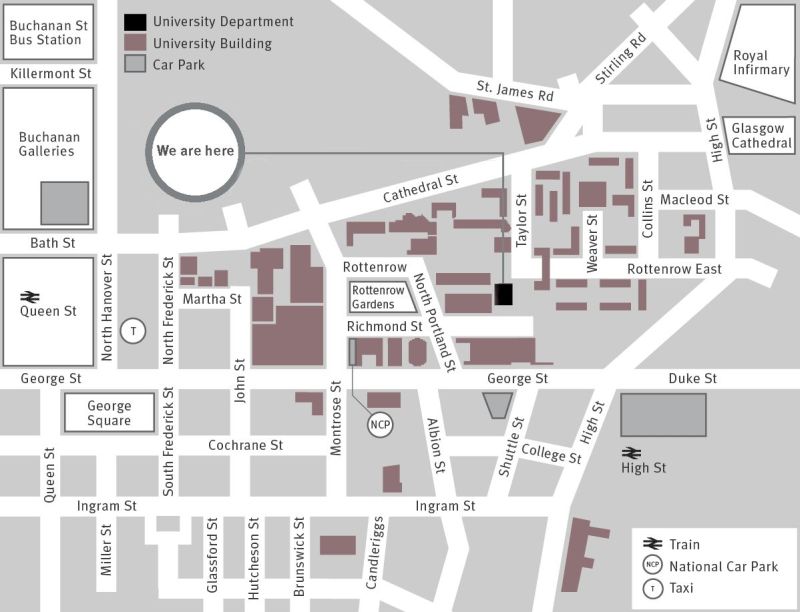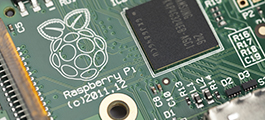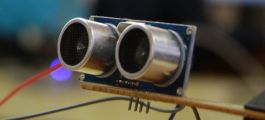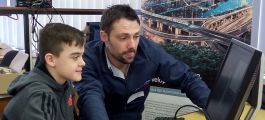Raspberry Pi Day
22nd April 2017 - 10am to 4pm
The Department of Physics at the University of Strathclyde hosted a Raspberry Pi day on the 22nd April 2017.
The Raspberry Pi
The Raspberry Pi is a credit card sized computer, designed to improve computer programming knowledge. It is a low cost but capable device that can be used by people of all ages to learn about computing. It connects to the Internet, plays HD video, and can be installed with a variety of operating systems.
The Raspberry Pi supports a multitude of applications and development tools - like Scratch which is designed to teach programming concepts to young people. The Raspberry Pi also makes it easy to connect to external sensors and electronics, allowing it to be incorporated into a wide range of projects, such as robots, games consoles, network routers, spacecraft, weather stations and more.
Computer programming is a key skill in today's world. It's used everywhere, from optimising the way car engines function, controlling aeroplanes in flight, designing precision components, to modelling complex systems like the weather. However computer programming is a skill that needs to be learnt and practised - experience programming, and solving problems with computers, can greatly enhance career opportunities for students and employees.
Agenda
| Time | Title | Speaker | Abstract | Slides | |
|---|---|---|---|---|---|
| 10:00-10:20 | Introduction | W.H. Bell | An introduction to the Raspberry Pi and the objectives behind the device. | Introduction | |
| 10:30-10:50 | Building a Quadcopter and using a Pi Zero for control | Luke Martin | Build a Quadcopter using a DJI Flamewheel kit, a Pi Zero, a custom version of Ardupilot and a Dark Water controller board and IMU. Flight can be controlled from either a ground station over WiFi or radio control. We are presently adding a Pi camera and using WiFi broadcast to transmit live video to another raspberry Pi. | Quadcopter | |
| 11:00-11:20 | Resurrecting Mainframes with Raspberry Pi | Jeremy Singer | This year, Glasgow University celebrates 60 years of computing. Glasgow was the first Scottish university to install a computer, back in 1957. The original mainframe machine was an English Electric Deuce, which occupied a room, drew 10kW of power and had just over 1kB of RAM. To celebrate the 60th anniversary of the Deuce computer, we are building a replica machine. This involves hundreds of LEDs and switches, a telephone dial, a Java emulator, oh yes - and a Raspberry Pi! I will bring parts of the machine along for a live demo on the day. | Resurrecting Mainframes | |
| 11:30-11:50 | Railway Control with a Raspberry Pi | Jonathan Calderwood | In 2016, Siemens graduates developed a model railway control system using simple electronics, Python programming and Raspberry Pi. The control system allows young people to interact with features of a modern railway such as automatic train operation (ATO), passenger information systems, train detection and even IO simulation for testing and development. The architecture mimics state-of-the-art railways, with multiple Raspberry Pi networked to exchange data. The STEMRail software was written to include tangible classes and objects such as 'train', 'track section' and 'signal' that can be physically demonstrated on the model. A live demonstration will be given, and visitors will have the opportunity to drive trains. | Railway Control | |
| 12:00-12:20 | Learning to code with Raspberry Pi | Craig Steele | Find out how to get started with computer programming using Raspberry Pi. Right out of the box, Raspberry Pi comes with the tools you need to start building your own apps, games and more. Craig will show you how to use these and start your journey to becoming a digital maker. | Learning to Code | |
| 12:30-13:30 | Lunch break | ||||
| 13:30-13:50 | PiSpy | Colin MacLeod | This talk will outline the use of a Raspberry Pi, Raspberry Pi camera and the piFaceCAD to capture and store photographs and make them into a time-lapse video as well as other possible uses of the hardware configuration. | ||
| 14:00-14:20 | Winning Monopoly with a Raspberry Pi | W.H. Bell | The Monopoly board game is a game of chance. The probability that a player lands on a square is not the same for all of the squares. In this talk, statistics and Python will be combined to describe the Monopoly game, revealing some of the key components of the game and suggesting the best strategy to win. | Monopoly | |
| 14:30-14:50 | Raspberry Pi in Education | Martin Goodfellow | The Raspberry Pi is a great device to teach physical computing and get more people interested in computer science, engineering and making. This talk will look at how you can use the Raspberry Pi in an educational setting and how I've used it personally for teaching. I will also showcase the Build It Scotland project I was involved with which involved Raspberry Pis, Minecraft and 3D printers. | Raspberry Pi in Education | |
| 15:00-15:20 | Ingredients for a great Pi (project) | Amanda Ford | Take one pi, add a generous helping of Minecraft, a handful of sensors, a large dollop of python with a pinch of Sonic Pi and a Lego figure to garnish. These are the ingredients used to create an exciting project which shows off the skills that my team and I gained over the previous day's learning at a Picademy event last summer in Newcastle. Our project saw Minecraft Steve (played by Lego Steve) trying to sneak into a house to steal gold, however in breaking in sensors set alarms off. This talk will show what we used and how we worked together to combine everyone’s components into one super project and make use of all the wonderful features that the Raspberry Pi offers. | Ingredients for a Great Pi Project | |
Outline
The Raspberry Pi day is an event for all levels of ability and involvement. We want it to be a day for parents and children, educators and pupils, students and makers to share their enthusiasm and knowledge for programming and computing fun.
During the day, there will be:
- Talks covering the basics of the Raspberry Pi, as well as programming and electronics applications
- A hands-on lab area, with Raspberry Pis available for interactive investigations and demonstrations (example code available)
- Space for guest projects too
Location
The event will take place within the Department of Physics at the University of Strathclyde, which is within walking distance of Queen Street railway station and Buchanan Street underground station.
Entrance for the event is from the 4th floor on the north side of the building, off Rottenrow.
Google Maps
Department of Physics,
John Anderson Building,
107 Rottenrow East,
Glasgow, G4 0NG



